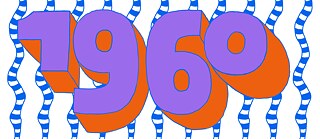As a songwriter (and lawyer), Franz Josef Degenhardt had certainly expressed his explicitly left-wing views on sociopolitical themes by 1968. His most famous song to date, "Spiel nicht mit den Schmuddelkindern" from 1965, takes an agitation-free and more sophisticated approach – and can still command relevance today.
Soundtracks
With eight German-language songs from eight decades, music journalist Mario Lasar highlights important cultural and social phenomena in (West) German post-war history.
Most of the songs and artists mentioned in this series can be listened to (in the order in which they are mentioned) in a Spotify playlist:
open.spotify.com/playlist/soundtracksBRD/
The starting point of the song lyrics is the classic rebellion of an adolescent member of middle-class society against the privileges of his class, which he perceives to be narrow-minded and restrictive.
[…]
So sprach die Mutter, sprach der Vater, lehrte der Pastor
Er schlich aber immer wieder durch das Gartentor
Literal translation:
Don’t play with the grubby kids!
[…]
So said Mother, so said Father, taught the pastor
But he kept sneaking through the garden gate
The charm of descending to the lowly ranks of the “rabbit hutches” anticipates what the English band Pulp would address thirty years later in Common People disguising oneself through playful experimentation with a different identity. But anyone who voluntarily occupies a marginalized position on a temporary basis might possibly forget that there are people who have no choice in the matter. It’s like taking a holiday in someone else’s life.
The nameless protagonist in Degenhardt’s song is then punished by ending up dead in the “rat pond”. Before this happens however, he has briefly learned to accept the privileges of his class – only to relapse again after a car accident, this time pathologically so:
Eines Tags in aller Helle
hat er dann ein Kind betört
und in einen Stall gezerrt.
Literal translation:
Once in broad daylight
he seduced a child
and dragged him into a barn.
The fact that the protagonist is (presumably) murdered in the end can be interpreted as revenge of the grubby kids, who ultimately appear to triumph.
Undoubtedly the song lyrics conceal how the singer feels about the protagonist. All the same, the latter is in no way portrayed as a popular figure or role model. But instead of aggressively destroying him, Degenhardt opts for a more subtle narrative approach. He describes in a formally artistic style what his protagonist does and what happens to him. The use of homophones (“und Kaninchenställe riss er ab / an ihre Stelle ließ er Gärten für die Kinder bauen”), multiple interlinked lists and other rhetorical tricks make the song a masterpiece of linguistic condensation. The rhythmic staccato sequencing of words generates plenty of dynamic presence. The focus is clearly on emphasizing the sound of language – yet without falling short on content either.
This is reinforced by the understated musical instrumentation, which is reduced to the interaction of two acoustic guitars. In this sense Schmuddelkinder belongs to the folk music tradition, where more of an accompaniment function is attributed to the music, which should not distract from the lyrics as far as possible. Yet the slightly schmaltzy tones of the theme repeated by the lead guitar undeniably evoke a certain mocking feel – which can be taken as a comment on the events described in the lyrics.
What in Schmuddelkinder might still be depicted in the form of a somewhat sardonic ballad with a sociopolitical background takes a turn towards an explicitly left-wing stance in Degenhardt’s work – during the politicization of life around 1968. Degenhardt addressed this altered agenda himself in his song Zwischentöne sind bloß Krampf im Klassenkampf (Nuances are just spasms in the class struggle):
wo bleibt Ihre Poesie?
Dinge bilderreich umschreiben, andeuten, das können Sie
Na schön, sag ich, das ist ja richtig
aber das ist jetzt nicht wichtig
Schöne Poesie ist Krampf im Klassenkampf.
The old customers moan too
what’s happened to your poetry?
Paraphrasing things vividly, hinting at them, you can do that
For sure, I say, that’s quite right
but it doesn’t matter now
Beautiful poetry is a spasm
in the class struggle.
Spiel nicht mit den Schmuddelkindern is in any case preserved as a poetic moral portrait that uses an agitation-free, sophisticated approach to paint a picture of class society in West Germany in the mid-1960s. At its core, the song can still command relevance in its own right.
Soundtracks
- 1950s: Just don’t overdo it with the freedom! (Fred Bertelmann – "Der lachende Vagabund")
- 1960s: A poetic moral portrait of class society (Franz Josef Degenhardt – "Spiel nicht mit den Schmuddelkindern")
- 1970s: An unusual alliance between green politics and Schlager hits (Udo Jürgens – "Tausend Jahre sind ein Tag")
- 1980s: Concrete and neon lights (Joachim Witt – "Der Goldene Reiter")
- 1990s: Of new possibilities (Blumfeld – "Tausend Tränen Tief")
- 2000s: When things are worth more than people (Die Goldenen Zitronen – „Wenn ich ein Turnschuh wär“)
- 2010s: Great cinema? (Helene Fischer – "Atemlos durch die Nacht")
- 2020s: A new power structure of gender roles (Christin Nichols – "Bodycount")
The publication of this article is part of PERSPECTIVES - the new label for independent, constructive, multi-perspective journalism.
>>> To know more about PERSPECTIVES
05/2024
